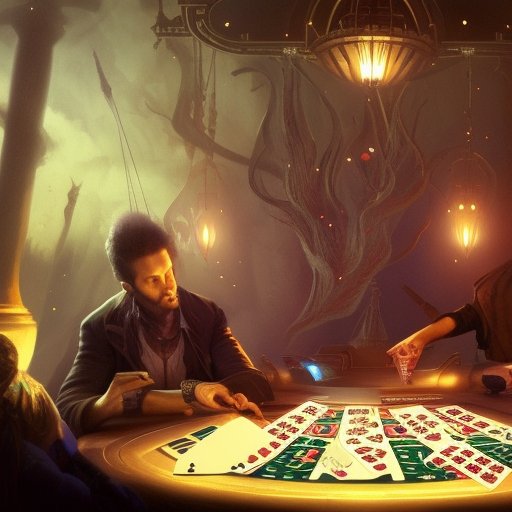
In the distant future, time travel through wormholes has become a popular form of entertainment and gambling. Paradox Poker is the newest craze, where players wager on erasing events from history through time travel. But with power comes consequences. Explore the science behind wormholes and time travel, and discover the ambiguous pros and cons of tampering with the fabric of time. Learn how Paradox Poker works, and the strategies needed to win big. Delve into the ethics and philosophical considerations of manipulating history, and ponder the future implications of time travel.
I. Introduction
The year is 2387, an era where time travel through wormholes has become a reality. The universe has become a playground for the adventurous, a place where the concept of time is malleable and unpredictable. But what if time travel was more than just an exciting adventure? What if it was a chance to become a high-stakes gambler in a game that could alter history itself?

Paradox Poker is the newest craze in the world of time travel. A game where players wager on erasing events from history through time travel. Competitors wager on the probability of events happening before they occur. But with great power like time travel comes great responsibility. The players of Paradox Poker have a burden to bear as they create their destinies through their wagers, and the stakes are high.
The implications of manipulating time are widespread, but the allure of controlling history remains irresistible. For the player, the temptation is not only to win the game but also to change their past while at it. The pastime may seem like juvenile fun, but those who stake huge sums on an uncertain outcome know the risk that comes with the game.
In the following sections, we delve deep into the world of Paradox Poker, exploring the scientific intricacies of wormholes and time travel. We will look into the various pros and cons associated with altering history, the game’s mechanics and strategies necessary for winning, its ethical and philosophical requirements, as well as the potential consequences for our world as we know it. Join us in exploring the universe of time travel and experience the thrill of fate-altering excitement.
II. The Science behind Wormholes and Time Travel
To understand the science behind time travel through wormholes, one must first understand what a wormhole is. A wormhole is a theoretical tunnel that connects two distinct points in space-time. By traveling through the wormhole, one can access the distant point much faster than by conventional means. However, wormholes have their risks. If a wormhole collapses while a spacecraft is traveling through it, the ship will be obliterated.

Time travel through wormholes, therefore, requires one to enter and exit the wormhole at precisely the right time to remain safe. The speed of time inside a wormhole does not match that of the external world, meaning that time travel into the past may be possible. However, due to the Law of Causality, changing a previous event will alter the future course of events, producing an endless chain of paradoxes.
Several considerations must be taken into account when using wormholes for time travel. First, a wormhole must be stable enough to maintain its shape while a craft travels through it. Second, a tremendous amount of energy is required to sustain a wormhole’s existence. The construction of a wormhole is a dangerous and time-consuming endeavor, and maintaining one is no easy task.
In essence, time travel through a wormhole is plausible, but the risks outweigh the benefits for most people. Distorting the fabric of time itself could lead to catastrophic consequences. Nonetheless, the idea of time travel entices many, and Paradox Poker enables them to experience the thrill of time manipulation safely. In the following sections, we discuss the pros and cons of such an endeavor and the game’s details, including the strategies necessary to win.
III. The Pros and Cons of Time Travel
As enticing as time travel may seem, it comes with its fair share of pros and cons. The idea of altering history to suit our present desires may bring us fleeting satisfaction, but the consequences of playing with the fabric of time are potentially catastrophic.

On the bright side, time travel would offer a chance to rectify mistakes of the past or experience different historical events firsthand. Imagine the ability to go back and converse with the great philosophers or to be present during world-changing events. The possibilities of learning and discovery are endless with time travel.
However, like the butterfly effect, altering the past could have a rippling effect on the future, changing entire courses of history that we know. The smallest change could lead to catastrophic outcomes, such as humanity facing nonexistence. The ramifications of changing the past could be unpredictable and irreversible, leaving us in a world that we no longer recognize.
Another con is that time travel opens up an avenue for people to alter their present and future to their pleasure. In the wrong hands, time travel could be used for criminal activity, such as stealing vital information or eliminating key individuals to rewrite narratives and create alternative realities. Who would want to attend a period in history where the Dalai Lama or Martin Luther King Jr. were eliminated from history at an early age to achieve sinister motives?
Moreover, would the past hold up to scrutiny with a closer look at our present values? How would we handle the psychological shock of witnessing past events that are viewed as far less ethical by modern standards?
IV. How Paradox Poker Works and Its Consequences
As you prepare to enter the world of Paradox Poker, you must understand the game’s mechanics and the gravity of your decisions. The game’s basic premise is simple; you wager on the probability of an event, and if you are successful, you can erase it from history. However, the mechanics go deeper than that.

The first step in the game is to pick your targets. The events you choose must be significant enough to warrant a high payout. The more significant the event, the higher the payout, but the greater the risk. The next step is to set your probability. You set the odds for your event occurring before it does, and the other players bet against your probability.
If you win, you erase the event from history. But this isn’t like Back to the Future where Marty McFly saved his own father but erased himself. The player’s past is not affected, only the historical events. The player also risks creating new timelines as a result of their actions.
For every action, there is an equal and opposite reaction, and this is true for the world of Paradox Poker. The consequences of erasing historical events can be far-reaching, leading to a butterfly effect that can alter history on a grand scale. One small change to the past can lead to a vastly different present.
Furthermore, the player must consider the potential consequences to their actions. While the game offers the chance to right wrongs or even erase tragedies, it can also lead to unintended outcomes. By erasing an event, the player may cause a worse outcome than if the event remained in history.
V. Tips and Strategies for Winning at Paradox Poker
To emerge victorious in Paradox Poker, one must master the art of wagering. The game’s outcome is based on the probability of the events tied to the wager. To improve your odds of winning, it is vital to consider past events and likelihoods. But one must also bear in mind that the simple act of traveling back in time may change the current state of events, rendering predictions unreliable.

One of the key tips for winning in Paradox Poker is to learn how to identify and exploit minor disruptions in time. When time travel causes an event to change, it sets off a chain reaction that can impact future events. These minor disruptions can be utilized to affect an outcome in your favor; they may seem insignificant initially, but they can transform into significant alterations in the future course of events.
Another way to increase your chances of success is to avoid large-scale disruptions. Changing significant events in history can have unforeseeable and possibly catastrophic consequences, so players need to think long-term before enacting any changes. Paradox Poker is a game of patience and wit. The right move can turn a losing hand into a winning one in a matter of seconds.
Finally, players of Paradox Poker must remain vigilant of their opponents’ moves. Interfering with another player’s wager to influence the odds of the game is not against the rules. One must be able to read the other players and keep an eye out for potential sabotage attempts.
VI. Ethical and Philosophical Considerations of Time Travel
Time travel through wormholes offers a new way to change the course of events that led to the present. But with the promise of limitless power to alter history comes an immense ethical burden. A question arises as to whether it is right to tamper with time in the first place.

The philosophical implications of altering history through time travel extend far beyond the game of Paradox Poker. If we change past events via time travel, how does it affect our present? The changes affect the future, but who decides what future is ideal? The act of altering time raises significant philosophical questions on the relationship between individuals and their destinies. It challenges the notion of free will and presents questions on the limits to human agency.
One of the most significant ethical considerations of time travel is the butterfly effect – a phenomenon where a small change in the past can drastically impact the future. For instance, something as simple as altering the timing of an event or eliminating a person from the past alters the entire timeline of events leading to the present. The potential consequences could be catastrophic. What is the morality of intentionally altering the future in such a manner?
Another ethical consideration is the temptation to use time travel for personal gain. Rich people could use it to their advantage to become wealthier, powerful individuals could manipulate history to satisfy their egos, and a variety of different people could potentially use time travel to eliminate competitors or further their own interests. How could we prevent those who have access to time travel technology from exploiting it, and what would be the rules surrounding its use? Would there be some sort of governing body to regulate the use of such technology?
VII. The Future of Time Travel and Its Impact on Our World
The impact of time travel on our world is one that we must consider seriously. The allure of changing the past is one that has become too powerful to ignore. Cautious persons have asked, “What if these changes ripple out, destroying our world as we know it?”

If we start altering history’s course, it’s difficult to know what will ripple out to what. A small change, influential ripple, could lead to major changes that we’re not prepared to handle. What if we accidentally prevent the birth of a future leader, hero or even cause the extinction of dinosaurs, altering the present and future of our world?
While time travel might appear to be a purely scientific and technological development, the impact of its use on humanity is impossible to predict. Using it for one’s own benefit might lead to changing the future for the worse, leading to unintended side effects.
Then there’s the matter of time travel itself; if it’s possible, can we really keep it a secret? What happens when a morally bankrupt individual or group gets a hold of it? What if they use it for their own selfish interests? What happens if they travel back and forth in time, meddling with history, creating massive rifts in timelines?
These questions are just but a few of those that must be taken into account. As we continue to explore the existence of time travel, humanity must exercise caution, restraint, and good judgment to ensure that we do not slip into an abyss that is entirely of our own making.
As for paradox poker, the game continues to draw enthusiasts and high rollers, despite the dangers it poses. Ultimately, only time will tell if humanity will handle the implications of Paradox Poker and Time Travel in general. Let us not forget to be cautious and reflective, as we move forward into the unknown.
VIII. Conclusion
As we come to the end of our exploration of Paradox Poker, the question remains: should we use time travel as a means of entertainment or for more? The thrill of the game may seem enticing, but we cannot ignore the potential implications of tampering with the fabric of time itself.

It is true that Paradox Poker offers players a unique opportunity to experience the untold wonders of the past, present, and future. But, the value of our history and the impact of our future on the lives of the generations to come can never be underestimated. We must be mindful of how our actions can drastically alter the course of time, for better or worse.
When all is said and done, the choice is for each individual to make. Do we gamble with the fate of our world for the sake of fun and excitement? Or do we recognize the weight of our responsibility and proceed with caution, knowing the implications of our actions?
As we close this article, we urge you to consider the consequences of your actions. While the concept of time travel and Paradox Poker may seem like a futuristic dream come true, we must remain mindful of how we use this tremendous power. With great power comes even greater responsibility. The universe we leave behind is in our hands; let us use our powers with wisdom, grace, and foresight.






